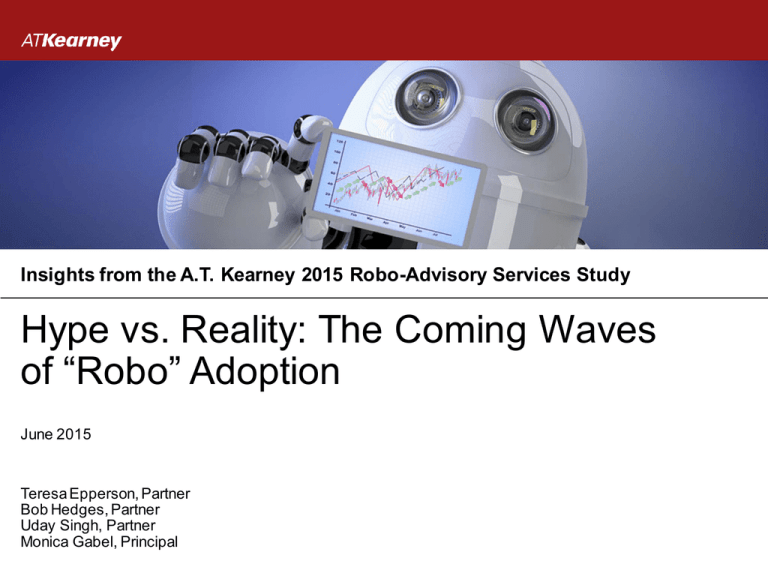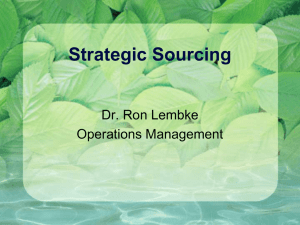Hype vs. Reality: The Coming Waves of “Robo” Adoption
advertisement

Insights from the A.T. Kearney 2015 Robo-Advisory Services Study Hype vs. Reality: The Coming Waves of “Robo” Adoption June 2015 Teresa Epperson, Partner Bob Hedges, Partner Uday Singh, Partner Monica Gabel, Principal The current document is based on the A.T. Kearney 2015 Robo-Advisory Services Study ■ The study was conducted with a nationally representative sample of more than 4,000 U.S. consumers at least 18 years of age who are “banked,” meaning they or someone in their household have a checking and/or savings account with a financial services provider ■ Conducted in May 2015 with an online panel, the study addresses consumers’ investment decision making, with focus on awareness of, interest in, and willingness to use robo-advisory services ■ “Robo-advisors” were defined as providers that offer automated, low-cost, investment advisory services through web-based and/or mobile platforms ■ The robo-advisory service was explained to survey takers as follows: once you enroll for the service, you enter your risk profile and, using advanced algorithms, the platform offers alternative personalized investment portfolios for you to choose from (this is different than investing in a mutual funds or ETFs that are not personalized) and continues to rebalance your portfolio as required. This is all done digitally (online or mobile), without you having to talk to a live person 2 Contact information Teresa Epperson, Partner Bob Hedges, Partner Teresa.Epperson@atkearney.com Bob.Hedges@atkearney.com Uday Singh, Partner Monica Gabel, Principal Uday.Singh@atkearney.com Monica.Gabel@atkearney.com 3 • Hype vs. reality? • The coming waves of consumer adoption • Who will be the winners and losers? • Strategic impacts and implications 4 Hype vs. reality? Robo-advisory is the next step in the evolution of asset management and financial advise Evolution of wealth management service models Traditional advisor Discount brokerages Online investment platforms Robo-advisors model Interaction Service Dedicated advisor Dedicated advisor Limited to no human interaction Fully digital (if desired) Offering Holistic advise Portfolio management + advisory Transactional investment management + minimal advisory Investment management + automated diversification Target customers Ultra-high net worth and high net worth High net worth & mass affluent Across wealth tiers Mainly mass affluent than others Pricing (disaggregated, $ per trade ) Source: A.T. Kearney 5 Hype vs. reality? Today, already 20% of consumers report being aware of robo-advisory services Awareness of robo-advisory services % aware of robo-advisory services among banked consumers Aware 20% Not aware 80% Question: A new ty pe of inv estment adv isors is emerging that of f ers automated, low-cost, inv estment adv isory services through web-based and/or mobile platf orms. These serv ices are sometimes ref erred to as “roboadv isors.” Once y ou sign up f or the serv ice, y ou enter y our risk prof ile and, using adv anced algorithms, the platf orm of f ers alternative personalized inv estment portf olios f or you to choose f rom (this is dif f erent than inv esting in a mutual f unds or ETFs that are not personalized) and continues to rebalance y our portf olio as required. This is all done digitally (online or mobile), without y ou hav ing to talk to a liv e person. Are y ou aware of such serv ices (e.g., Wealthf ront, SigFig, FutureAdv isor, Schwab Intelligent Portf olios)? 6 Source: A.T.Kearney 2015 Robo-Adv isory Serv ices Study (N=4,002) Hype vs. reality? We are early in the curve for adoption of robo-advisory services… Adoption of robo-advisory services Share by robo-advisory providers % who adopted robo-advisory services among banked consumers % who used each provider among banked adopters of robo-advisory services 5% 4% Schwab Intelligent Portfolio 25% Vanguard Personal Advisor Services 25% 3% FutureAdvisor 3% 22% Wealthfront 2% 20% Betterment 13% SigFig 13% 1% 0% % adopters N=4,002 Hedgeable 12% N=129 Question: A new ty pe of inv estment adv isors is emerging that of f ers automated, low-cost, inv estment adv isory services through web-based and/or mobile platf orms. These serv ices are sometimes ref erred to as “robo-adv isors.” Once y ou sign up f or the serv ice, y ou enter y our risk prof ile and, using adv anced algorithms, the platf orm of f ers alternative personalized inv estment portf olios f or you to choose f rom (this is dif f erent than inv esting in a mutual f unds or ETFs that are not personalized) and continues to rebalance y our portf olio as required. This is all done digitally (online or mobile), without y ou hav ing to talk to a liv e person. Are y ou aware of such serv ices (e.g., Wealthf ront, SigFig, FutureAdv isor, Schwab Intelligent Portf olios)?; Hav e y ou used the automated inv estment adv isory services, also known as “robo-adv isors”?; Which of the f ollowing automated inv estment adv isory services or “robo-adv isor” prov iders hav e y ou used? Select all that apply Source: A.T.Kearney 2015 Robo-Adv isory Serv ices Study 7 Hype vs. reality? … however, consumer interest in and likelihood to adopt robo-advisory services are high Interest in robo-advisory services % who selected each level of interest in robo-advisory services among banked consumers Likelihood to use robo-advisory services to manage household taxable investable assets % who selected each option among banked consumers whose households own taxable investable assets and are at least somewhat interested in robo-advisory services Extremely likely 4% Extremely Very interested interested 3% 6% Interested 15% Not at all likely 31% Likely 19% Not at all interested 52% N=4,002 Very likely 10% Somewhat interested 24% N=1,901 Somewhat likely 36% Note: Taxable household inv estable assets include liquid f unds and taxable inv ested f unds in brokerage/inv estment accounts, b ut exclude f unds in non-taxable accounts (e.g., IRAs) and other retirement plans (e.g., 401(k)s) Question: How interested are y ou in using (or continue to use) automated inv estment adv isory services, also known as “robo-adv isors,” to manage and inv est part or all of y our household f inancial assets?; Ov er the next 12 months, how likely is y our household to use (or continue to use) automated inv estment adv isory serv ices, also known as “robo-adv isors,” to manage and inv est part or all of y our taxable household inv estable assets (include liquid f unds and inv estments in brokerage accounts, but exclude f unds in IRAs and other retirement plans)? 8 Source: A.T.Kearney 2015 Robo-Adv isory Serv ices Study Hype vs. reality? We have developed a forecast model to assess adoption of robo-advisory services and impact on future asset flows Market Market after assets shift Assets in-play Invested assets New invested assets • Segment – UHNW – HNW – Mass Affluent – Mass Market • Segment – UHNW – HNW – Mass Affluent – Mass Market • Asset type – Non-401(k)s – 401(k)s • Service model – Traditional advisor – Self-directed – Robo-advisor Assets in-play in % of consumers changing provider/model invested assets Assets in-play from non-invested assets Switching decision criteria Non-invested assets • Segment – UHNW – HNW – Mass Affluent – Mass Market % movement of in-play assets to each service model % Shift from non-invested assets to invested assets (going to robo-advisors) • Service model – Traditional advisor – Self-directed – Robo-advisor – Price – Transparency – Relationship services – Investment expertise Fee structure by service model Source: A.T. Kearney • Asset type – Non-401(k)s – 401(k)s Fee Revenue by service model 9 Hype vs. reality? Not hype, but reality: Robo-advisory services will become mainstream among U.S. consumers over the next 3-to-5 years Forecast of robo-advisory services adoption rate % of total invested assets invested using robo-advisory services 5.6% 4.1% 2.7% 1.7% 0.9% 0.5% 2015 E 2016 E 2017 E Note: Total invested assets include taxable investments, non-taxable investment, and 401(k) assets Source: A.T. Kearney simulation model 2018 E 2019 E 2020 E 10 • Hype vs. reality? • The coming waves of consumer adoption • Who will be the winners and losers? • Strategic impacts and implications 11 The coming waves of consumer adoption Based on consumer interest in/likelihood to adopt robo-advisory services, we have identified multiple waves of consumer adoption Share of consumers in each adoption wave Among banked consumers Pioneers 7% Enthusiasts 26% Unlikely adopters 52% Potential late adopters 15% Question: How interested are y ou in using (or continue to use) automated inv estment adv isory services, also known as “robo-adv isors,” to manage and inv est part or all of y our household f inancial assets?; Ov er the next 12 months, how likely is y our household to use (or continue to use) automated inv estment adv isory serv ices, also known as “robo-adv isors,” to manage and inv est part or all of y our taxable household inv estable assets (include liquid f unds and inv estments in brokerage accounts, but exclude f unds in IRAs and other retirement plans)? 12 Source: A.T.Kearney 2015 Robo-Adv isory Serv ices Study (N=4,002) The coming waves of consumer adoption Consumers in each wave of robo-advisory adoption can be described based on demographics and investing sophistication Pioneers Enthusiasts Younger consumers (50% under 35 years old) Slightly older than Pioneers Highly employed (74% employed full or part time) Highly employed (71% employed full or part time) Sophisticated and risk-taking investors (e.g., high penetration of investment accounts, 20% self-described as risk takers) Less sophisticated investors (44% novice investors) and more cautions investors Potential late adopters Slightly older than Enthusiasts adopters, with a higher share of retirees Limited investment experience (28% without experience and 43% novices) Unlikely adopters Older consumers (45% over the age of 55) High incidence of retirees (30%) Non-risk takers (70% cautious or risk adverse investors) Questions: What is y our total household inv estable assets (e.g., assets y ou can f reely invest in whatev er asset ty pes and cat egory y ou choose)?; What percentage of y our total household inv estable assets are held in each of the f ollowing asset categories? Categories include liquid f unds, taxable inv ested assets, and non-taxable inv ested assets; Do y ou or any one in y our household hav e assets in the employ er-f unded retirement plan (e.g., 401(k) or 403(k) plans) of f ered by a current employ er?; Do y ou or any one in y our household hav e assets in any employ er-f unded retirement plan (e.g., 401(k) or 403(k) plans) at prev ious employ er(s) (where y ou/they no longer work)?; How would y ou describe y our experience with inv esting/making inv esting decisions?; Which of the f ollowing best describes y our risk tolerance as it relates to making f inancial decisions f or y ou and y our household? 13 Source: A.T.Kearney 2015 Robo-Adv isory Serv ices Study (N=4,002) The coming waves of consumer adoption Pricing ---low cost and transparency--- is the critical element of the robo-advisory offering Importance of different factors when selecting a robo-advisory service or provider to manage household taxable investable assets Avg. score allocated to each factor among banked consumers in each adoption wave whose households own taxable investable assets Pioneers 36 25 23 16 100 points Enthusiasts 37 Pricing 24 Investment expertise 24 15 Simplicty Relationship services Note: Taxable household inv estable assets include liquid f unds and taxable inv ested f unds in brokerage/inv estment accounts, but exclude f unds in non-taxable accounts (e.g., IRAs) and other retirement plans (e.g., 401(k)s) Question: How interested are y ou in using (or continue to use) automated inv estment adv isory services, also known as “robo-adv isors,” to manage and inv est part or all of y our household f inancial assets?; Ov er the next 12 months, how likely is y our household to use (or continue to use) automated inv estment adv isory serv ices, also known as “robo-adv isors,” to manage and inv est part or all of y our taxable household inv estable assets (include liquid f unds and inv estments in brokerage accounts, but exclude f unds in IRAs and other retirement plans)?; When selecting an automated inv estment adv isory/“robo-adv isor” serv ice or prov ider f or y our taxable household inv estable assets, how important would each of the f ollowing f actors be in y our decision making? Please allocate 100 points across the f our f actors based on the relativ e importance y ou assign to each of them 14 Source: A.T.Kearney 2015 Robo-Adv isory Serv ices Study (Pioneers N=270, Enthusiasts N=1,041) The coming waves of consumer adoption Over the next five years, we anticipate two waves of robo-advisory services adoption Wave 1: Pioneers Younger and sophisticated investors Likely to adopt robo-advisory services in the near-term Interested in a new, low cost, approach to investing Wave 2: Enthusiasts Less experienced/novice investors First need to do research about the robo-advisory industry and the providers Likely to be shifting funding from liquid funds to low cost, robo-advisory mutual funds and ETFs To accelerate adoption, providers need to invest in increasing awareness of roboadvisory services and develop a track record to probe the strength of the business model to more careful/risk adverse investors 15 The coming waves of consumer adoption Depending on the adoption wave, specific features and approaches are required to succeed in the robo-advisory space Targeted marketing to experienced, technologysavvy, and risk-taking investors Wave 1: Competitive and transparent pricing Pioneers Platform data security Management and aggregation of multiple accounts across providers Wave 2: Enthusiasts Competitive and transparent pricing Marketing and promotion of services Proven track record and customer satisfaction 16 The coming waves of consumer adoption It is important to note that Pioneers will commit a significant share of their assets to the robo-advisory model Share of assets to be invested via robo-advisory services % of taxable household investable assets consumers are willing to invest via robo-advisory services among banked consumers in each adoption wave 50% 40% 40% 30% 19% 20% 10% 0% Pioneers Enthusiasts Note: Taxable household inv estable assets include liquid f unds and taxable inv ested f unds in brokerage/inv estment accounts, b ut exclude f unds in non-taxable accounts (e.g., IRAs) and other retirement plans (e.g., 401(k)s) Question: Y ou said that y ou are at least somewhat likely to use automated inv estment adv isory serv ices or “robo-adv isors” to manage y our household inv estment portf olio in the near f uture. What portion of y our taxable household inv estable assets (include liquid f unds and inv estments in brokerage accounts, but exclude f unds in IRAs and other retirement plans) are y ou willing to inv est v ia this ty pe of platform? Please enter a percentage between 1% and 100% 17 Source: A.T.Kearney 2015 Robo-Adv isory Serv ices Study (Pioneers N=270, Enthusiasts N=1,041) • Hype vs. reality? • The coming waves of consumer adoption • Who will be the winners and losers? • Strategic impacts and implications 18 Who will be the winners and losers? The prospective winners and losers can be evaluated across four dimensions Asset flows Service model Current providers Aspiring disruptors 19 Who will be the winners and losers? Consumers’ non-invested liquid funds will play an important role in growth of robo-advisors Sources of household taxable investable assets likely to be managed using robo-advisory services % who selected each source among banked consumers in each adoption wave whose households own taxable investable assets Pioneers 70% Enthusiasts 70% 65% 60% 60% 50% 50% 40% 40% 31% 30% 25% 39% 30% 20% 20% 10% 10% 0% 58% 19% 0% Money we currently have in liquid funds Taxable funds we currently have invested New money that will be generated from income, sale of physical assets, return on existing investments Money we currently have in liquid funds New money that will be generated from income, sale of physical assets, return on existing investments Taxable funds we currently have invested Note: Taxable household inv estable assets include liquid f unds and taxable inv ested f unds in brokerage/inv estment accounts, but exclude f unds in non-taxable accounts (e.g., IRAs) and other retirement plans (e.g., 401(k)s) Question: How interested are y ou in using (or continue to use) automated inv estment adv isory services, also known as “robo-adv isors,” to manage and inv est part or all of y our household f inancial assets ?; Ov er the next 12 months, how likely is y our household to use (or continue to use) automated inv estment adv isory serv ices, also known as “robo-adv isors,” to manage and inv est part or all of y our taxable household inv estable assets (include liquid f unds and inv estments in brokerage accounts, but exclude f unds in IRAs and other retirement plans)?; Where are the tax able household inv estable assets that y our household would inv est through automated inv estment adv isory serv ices or “robo-adv isors” most likely to come f rom? Select all that apply 20 Source: A.T.Kearney 2015 Robo-Adv isory Serv ices Study (Pioneers N=270, Enthusiasts N=1,041) Who will be the winners and losers? Adopters of robo-advisory services will be primarily moving from self-directed service models Current investment service model for household investments % who selected each service model among banked consumers in each adoption wave whose households own investments 100% 17% 21% 80% 17% 33% 12% 20% 27% 17% 60% 16% 33% 10% 16% 8% 40% 6% 13% 20% 4% 38% 31% 44% 17% 0% Pioneers Self-directed Enthusiasts Self-directed with occasional guidance Advised Potential late adopters Managed Unlikely adopters Do not have investments Note: Inv estments include taxable inv estments (assets inv ested in brokerage accounts) and non-taxable inv estments (assets held in IRA accounts) but exclude assets in any employ ment retirement plan (e.g., 401(k) or 403(k) plans) Question: Which of the f ollowing statements best describes y our household inv estment approach and sty le? 21 Source: A.T.Kearney 2015 Robo-Adv isory Serv ices Study (Pioneers N=270, Enthusiasts N=1,041, Potential late adopters N=590, Unlikely adopters N=2,101) Who will be the winners and losers? Aspiring disruptors will find a significant opportunity in robo-advisory ■ Self-directed-oriented competitors who are prepared to compete more aggressively on pricing ■ Traditional brokers who are seeking to transform their service/business models ■ Strongly-branded financial services providers who are seeking new business growth opportunities ■ Strongly-branded financial services providers who are not vulnerable to the disruptive business impacts from robo-advisors ■ Leading competitors who have a strong strategic vision of a consumer-driven financial services marketplace 22 • Hype vs. reality? • The coming waves of consumer adoption • Who will be the winners and losers? • Strategic impacts and implications 23 Strategic impacts and implications We can look at ETFs as a strong strategic disruption analog for the adoption of robo-advisory services Historical ETF adoption ETF net assets as a percentage of total U.S. investable assets 4.9% 4.5% 3.7% 3.9% 3.1% 2.2% 2.3% 2007 2008 1.7% 0.2% 1999 0.4% 0.5% 2000 2001 0.7% 2002 1.2% 1.4% 2004 2005 0.9% 2003 2006 2009 2010 2011 2012 2013 Due to the forces of digitalization, we anticipate robo-advisors’ penetration/adoption to occur much faster than it occurred for ETFs Source: Inv estment Company Institute (ICI), “2014 Inv estment Company Fact Book” 24 Strategic impacts and implications To assess the potential impact of robo-advisors, A.T. Kearney has developed a market impact model 1 Estimate total size of the addressable market and assets in-play, considering changes in customer shopping preferences 2 Estimate additional shift in asset from non-invested assets (e.g., cash, savings) to invested assets due to the emergence of non-traditional players (e.g., robo-advisors) 3 Estimate resulting robo-advisor market share and revenue potential of robo-advisory services 4 Estimate industry revenue impact scenarios (base case vs. price war case) from the emergence of robo-advisors 25 Strategic impacts and implications Between shifts from traditional advisors and “new investors,” ~$2 trillion will be managed under robo-advisors by 2020 Estimated U.S. robo-advisors assets under management In trillions of dollars ~2.2 CAGR +68% 1.5 ~1.1 Shift from non-invested assets1 ~1.1 Shift from invested assets2 0.7 0.9 0.4 0.3 0.0 0.2 2016E 0.5 0.1 0.4 2017E 0.8 0.5 2018E 2019E 1. Non-invested assets include liquid funds (e.g., cash and cash equivalent deposits) 2. Invested assets include credit market instruments, corporate equities, mutual funds, IRAs and 401(k) Source: A.T. Kearney simulation model 2020E 26 Strategic impacts and implications The growth of the robo-advisors will erode overall asset management revenue Scenario 2 – Price War 2 Scenario Scenario 1 - Base Case Scenario Industry revenues fall due to shifts to the roboadvisory model; traditional players maintain prices Loss1 in Revenue – Base Case In billions of dollars Traditional players compete with robo-advisors by lowering their fee structures Loss1 in Revenue – Price War In billions of dollars -1 -3 -1 -3 -32 -5 -7 -61 -8-12 2016E 2017E 2018E 2019E 2020E -85-90 2016E 1. Includes management/advisory fee, transaction fees, and fund fees combined 2. Price w ar case assumes 0.61% management fee (vs. 1%) and 0.13% robo-advisor fee (vs. 0.25%) by 2020 Source: A.T. Kearney simulation model 2017E 2018E 2019E 2020E 27 Strategic impacts and implications The strategic implications of the emergence of robo-advisory services could be profound Increasing consumer expectations for transparency, low-cost products, and “digitallyagile” solutions Re-evaluation by consumers of their investment relationships and resulting assets flows to the “best available” investment solutions Broad market availability of the robo-advisory model and pricing becoming market expectation Recalibration of the traditional asset management business/delivery model and revenues 28 Strategic impacts and implications The opportunities and threats for traditional industry players will depend on their current position Direct brokers Continue to focus on the self-directed segment, but be required to embrace the new, higher-digital experience standards and lower price points Be prepared to compete more aggressively on pricing Traditional advisory businesses Anticipate increased pricing/cost pressures and need to embrace opportunities for automation and efficiency Be prepared to work to transform the service/business models Strongly-branded financial services providers Depending on one’s potential vulnerability to re-pricing/disintermediation, robo-advisory services represents a meaningful growth opportunity Consider the opportunity as a chance to play the role of the growth-oriented disruptive competitor Leading consumer brands Being a non-participant in the business today, provides an opportunity to enter the business as a new participant Consider entering the business on the strength of the trusted brand positioning with a private label partner 29 Strategic impacts and implications Market players who want to lever the robo-advisory model should consider several elements of the potential offering Have investment offering today Fit into business strategy and brand Strategic/ opportunity Targeted customer segments assessment Economics of the robo-advisory business and implications for the existing business Do not have investment offering today Assessment of the business growth opportunity Potential adoption of the robo-advisory service (current vs. new customers)? Incremental revenue/profit potential due to the introduction of robo-advisory services Potential challenges and conflicts Cannibalization risks Impact on existing revenues and optimization of overall profitability Impact of robo-advisory on the existing business priorities (e.g., resources, investments, revenues) Go-tomarket approach Build vs. “buy” (assess partnership) Build vs. “buy” (assess partnership) Additional internal capabilities requirements Additional internal capabilities requirements Go-to-market strategy (e.g., marketing, distribution, branding)? Timing of robo-advisory services launch Potential channel conflicts Pricing approach for robo-advisory services (in the context of other services/business models) Ranking of offering robo-advisory services relative to the existing set of strategic priorities Go-to-market strategy (e.g., marketing, distribution, branding)? 30 Strategic impacts and implications There are great reasons for optimism regarding the robo-advisory service model Forecast of robo-advisory services adoption rate % of total invested assets invested using robo-advisory services 5.6% 4.1% 2.7% 1.7% 0.9% 0.5% 2015 E 2016 E 2017 E Note: Total invested assets include taxable investments, non-taxable investment, and 401(k) assets Source: A.T. Kearney simulation model 2018 E 2019 E 2020 E 31 A.T. Kearney is a leading global management consulting firm with offices in more than 40 countries. Since 1926, we have been trusted advisors to the world's foremost organizations. A.T. Kearney is a partner-owned firm, committed to helping clients achieve immediate impact and growing advantage on their most missioncritical issues. For more information, visit www.atkearney.com. Americas Atlanta Bogotá Calgary Chicago Dallas Detroit Houston Mexico City New York Palo Alto San Francisco São Paulo Toronto Washington, D.C. Asia Pacific Bangkok Beijing Hong Kong Jakarta Kuala Lumpur Melbourne Mumbai New Delhi Seoul Shanghai Singapore Sydney Taipei Tokyo Europe Amsterdam Berlin Brussels Bucharest Budapest Copenhagen Düsseldorf Frankfurt Helsinki Istanbul Kiev Lisbon Ljubljana London Madrid Milan Moscow Munich Oslo Paris Prague Rome Stockholm Stuttgart Vienna Warsaw Zurich Middle East and Africa Abu Dhabi Doha Dubai Johannesburg Manama Riyadh 32





